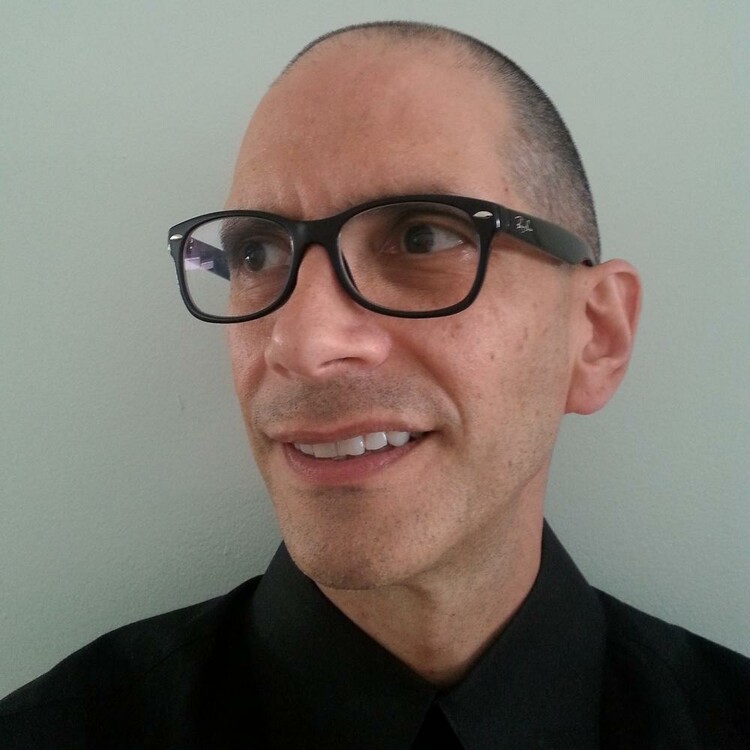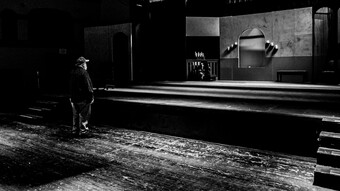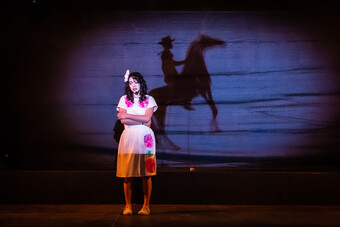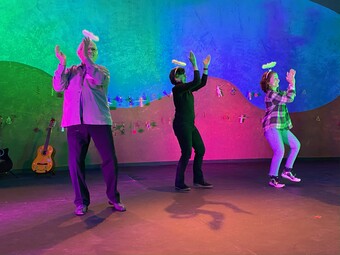Constructing a Bridge Culture
This week we’re publishing new writing and multimedia about the twenty-one-year artistic collaboration between Pregones Theater and Roadside Theater. The collaboration bridges two vast geographies and cultures, Puerto Rican and Appalachian, and two distinct aesthetics. Our series explores the creation of BETSY!, a musical about a Bronx Jazz singer and performer uncovering the secrets of her family’s history. Join us for discussion with artists and scholars about creating works of art that probe beyond clichés into the frayed ends of American pluralism. —Jamie Haft and Arnaldo J. López
I live and work at Appel Farm Arts and Music Center, in southern New Jersey. Not the shore or the Philadelphia suburbs, but the rural, under-resourced, and largely forgotten area in between—the part this hilarious (and often accurate) map calls “pretty much Alabama.” On Sunday, April 12, I’ll be traveling to New York with fifteen local families to see BETSY!. It’s only a two-and-a-half-hour drive, but in many ways it’s a world away. I can’t help but wonder: how will these family members, grade school kids and grandparents, poor and middle class, white, black, Asian, and indigenous, find themselves and their stories within a play about Appalachian and Puerto Rican conflicting identities and family secrets?
We’ll only know for sure after they’ve seen the show, of course—and after we’ve done some intergenerational family story circles after the show, telling our own stories about what we saw, who we are, and what we hope for in our community. But in the meantime, we can learn a lot from how Roadside and Pregones worked through similar questions. After all, there’s nothing obvious about how (or even why) a mostly-white theatre company from Appalachia and a mostly-Puerto Rican theatre company from the Bronx would come together, find themselves in each other, and work for two decades on shared pieces of theatre. What do they have in common that would make them start such a process? Dudley Cocke of Roadside, quoted in a forthcoming article by Maribel Álvarez, answers this question the way he usually does:
"Before Roadside and Pregones existed as companies, Appalachia and the Bronx were already playing tag at the bottom of the Fed’s annual list of America’s most economically distressed communities. After several years of following which community was winning, I reasoned the Bronx must be an enclave of Appalachia’s dear lost cousins—or perhaps vice versa.
In the field of broad-based community organizing, where I’ve done some work and a lot of research, these kinds of answers present a challenge. They’re both examples of ‘negative’ solidarity, solidarity based on the shared experience of oppression. Yet if two (or more) cultures want to work together toward ending that oppression, many organizers would argue, this kind of negative solidarity won’t be enough. They also need positive solidarity: a base of shared experiences, shared memories, and above all shared cultural traditions to build on."
Rosalba Rolón of Pregones gives a similar, if less tongue-in-cheek answer, in a conversation with Cocke convened a couple of weeks ago for this series: “We have common relationships with oppressing systems in our history, hundreds of years of that. We both are the ‘other.’”
In the field of broad-based community organizing, where I’ve done some work and a lot of research, these kinds of answers present a challenge. They’re both examples of “negative” solidarity, solidarity based on the shared experience of oppression. Yet if two (or more) cultures want to work together toward ending that oppression, many organizers would argue, this kind of negative solidarity won’t be enough. They also need positive solidarity: a base of shared experiences, shared memories, and above all shared cultural traditions to build on.
BETSY!, both the show itself and the twenty-one-year history of cultural exchange and artistic collaboration that produced it, can be seen as a sustained effort to construct this kind of positive solidarity. Not to construct it in a “fake” way—as in “[something we don’t like] is a social construction!”—but in the sense of Angela Davis in The Revolution Will Not Be Funded: “It is extremely important not to assume that there are ‘communities of color’ out there fully formed, conscious of themselves, just waiting for vanguard organizers to mobilize them into action….[W]e have to think about organizing as producing the communities, as generating community.”
Or as Cocke described in the recent talk with Rólon:
"In this intercultural work we often speak of building a bridge between two places. In bridge work, the span’s strength depends in part on the strength of the posting on either side. That posting is the strength and depth of our respective cultures. When we build that span, we're relying on our traditions to anchor what we’ll create together. We hope audience members, whether in Appalachia or the Bronx, will experience the span as sprung from who they are and have been."
The postings, it turns out, were rather strong. “At the end of the day, we are different, but we’re not that different,” suggested Rolón. When the companies first came together in 1994, she recalled “I think it took all of about the first hour together in our theatre to know that we didn’t have to make too much effort to be culturally understood by each other. That we had something like the same cast of characters in each culture.”
The span—the part being constructed by the artists—is the story of BETSY!, which weaves the Appalachian and Puerto Rican stories together in ways that aren’t always factually accurate. And that “constructed”-ness, Rolón explains, is part of the point:
"I feel extremely excited that we know each other so well that we can make up whatever we want…. “We can kill this one, or give that one another brother, or we can morph this family.” We’re talking about our families, so we are at liberty to ground the work in reality and fantasize into a new reality. The story is as real as it’s going to get, but we take off in this magical world that we have given ourselves permission to have because this is not, after all, a thesis—it’s a play."
And it works, Cocke suggests, because both cultures already see theatre in the same way:
"Our Appalachian audiences come to the theatre not just to be entertained—though of course they come to be entertained—but also to experience their own stories and to see something of their own life on the stage. When we first went to the Bronx, we could tell the audience, who looked different than our home audience, was seeing some of themselves in our Appalachian stories and songs. Then, when Pregones came down to our mountain home, you could feel the crackle in the theatre as our audience members connected with the Puerto Rican stories and music. In both locations, the informality of the artists mingling with audience members before and after the performances was important. Our Appalachian and Puerto Rican humanness framed the art on the stage."
Will our families from Appel Farm find their own place on the span that Roadside and Pregones have built? And in doing so, discover the strength of their own postings? We're excited to find out.











Comments
The article is just the start of the conversation—we want to know what you think about this subject, too! HowlRound is a space for knowledge-sharing, and we welcome spirited, thoughtful, and on-topic dialogue. Find our full comments policy here